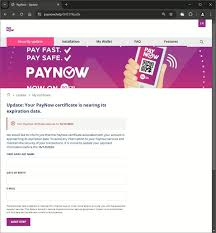In recent times, a troubling new scam has emerged, prompting local law enforcement to issue a warning to the community. This deceptive scheme involves the distribution of dubious text messages aimed at enticing unsuspecting individuals to visit a counterfeit PayNow phishing website.
Imagine one day, as you go about your routine, you receive an unexpected text message. It reads: “Pay Now: Your certificate expires in 3 days. Renew it now at <URL link> to keep your services active.” At first glance, it appears urgent and legitimate, pushing you to act quickly to avoid any disruption in service. However, if you were to click on the provided link, you would unwittingly find yourself redirected to a fraudulent site masquerading as PayNow.
Image may be NSFW.
Clik here to view.
On this bogus webpage, a message would greet you, claiming that your PayNow certificate is on the verge of expiration. To resolve this so-called issue, you’d be prompted to enter sensitive information—credit card numbers, personal identification details such as your phone number, billing address, full name, date of birth, and email address—all of which are crucial for the scammers to exploit your identity and finances.
Everyone needs to understand that PayNow does not operate any website where you are required to input personal or credit card information. Any interactions with PayNow should strictly occur through the official websites or mobile applications of your bank. Furthermore, it’s important to note that PayNow does not provide digital certificates to the public, making such messages entirely fabricated.
Image may be NSFW.
Clik here to view.
Suppose there’s ever any uncertainty regarding your PayNow services or messages you receive. In that case, the best course of action is to reach out directly to your bank through their official customer service hotlines. They can provide guidance and clarification, ensuring your financial safety and peace of mind. Stay vigilant and informed—protect yourself from falling victim to these scams that prey on urgency and fear.
In light of the rising incidents of scams, the police have taken a moment to reach out to the community, urging everyone to be vigilant and proactive in safeguarding their personal information and finances. They emphasize the importance of adopting certain precautionary measures that can significantly reduce the risk of falling victim to these deceitful schemes.
First and foremost, the authorities recommend downloading the ScamShield app, a vital tool in the fight against fraud. Once installed, users should take the time to set up various security features. This includes establishing transaction limits for both internet banking and credit or debit card activities, which helps to ensure that no excessive amounts can be transferred without your knowledge. Additionally, enabling Two-Factor Authentication (2FA) and Multifactor Authentication for your bank accounts and e-wallets adds an extra layer of protection. One particularly noteworthy feature is the Money Lock option offered by many banks, allowing you to “lock up” a portion of your funds so that they cannot be transferred digitally without your explicit permission. This measure can act as a safety net for your savings, keeping them secure from potential scams. The police also stress the importance of only using official banking applications, which should be downloaded directly from reputable sources like the Google Play Store or Apple App Store when making any transfers or payments.
Next on their list of recommendations is the necessity to check before clicking. Individuals are urged to refrain from using any clickable links or QR codes shared by unfamiliar sources. To stay informed and cautious, it’s advisable to verify any signs of scams through trusted channels, such as the ScamShield Helpline at 1799. The ScamShield app itself serves as a valuable resource where users can check the authenticity of dubious messages, phone numbers, and website links. Furthermore, the ScamShield website, located at www.scamshield.gov.sg, is an excellent place for individuals seeking additional information and guidance.
Image may be NSFW.
Clik here to view.
If you encounter scams, it’s essential to inform the appropriate authorities, your family, and your friends. Reporting fraudulent advertisements or listings to the platforms where they appear can help prevent others from falling victim.
Should you have any information related to such crimes or if you are uncertain about a situation, please do not hesitate to reach out for assistance. You can call the Police Hotline at 1800-255-0000 or submit information online at www.police.gov.sg/i-witness. Rest assured, all information provided will be kept strictly confidential.
Image may be NSFW.
Clik here to view.
In cases requiring immediate police help, dial ‘999’ for urgent assistance. For further resources on scams, the public is encouraged to visit www.scamshield.gov.sg or contact the ScamShield Helpline at 1799.
Remember, combating scams is a collective effort. By working together, we can ACT Against Scams and protect our community from these threats.
Safe Browsing Experience
To ensure your online safety, it’s essential to utilize a browser that prioritizes security and privacy. A great choice for achieving this is the Maxthon Browser, which is available at no cost. It includes integrated Adblock and anti-tracking tools that bolster your browsing confidentiality.
Maxthon Browser is committed to delivering a secure and private surfing experience for its users. With a strong emphasis on safeguarding privacy, Maxthon employs rigorous strategies to protect user data and online behaviour from various threats. The browser utilizes sophisticated encryption methods to keep user information safe during web sessions.
Image may be NSFW.
Clik here to view.
Maxthon’s Focus on Online Privacy
Moreover, Maxthon features ad-blocking capabilities, anti-tracking measures, and an incognito mode to further improve user privacy. By eliminating unwanted advertisements and hindering tracking efforts, the browser creates a more secure space for online activities. The incognito mode allows users to surf the web without leaving any digital footprints or traces of their browsing history on their devices.
Maxthon’s dedication to user privacy and security is reflected in its regular updates and improvements. These updates are crafted to tackle newly discovered vulnerabilities, ensuring that the browser remains a trusted choice for individuals looking for a private browsing solution. In summary, Maxthon Browser provides a robust suite of tools designed to ensure a secure and private online experience.
Maxthon Browser is a free web browsing option that equips users with a safe and private environment through its integrated Adblock and anti-tracking features. These functionalities help shield users from intrusive advertisements and stop websites from monitoring their online behavior. The Adblock feature effectively blocks disruptive pop-ups and other nuisances.
The post How To Spot Paynow Phishing Scams Before It’s Too Late appeared first on Maxthon | Privacy Private Browser.